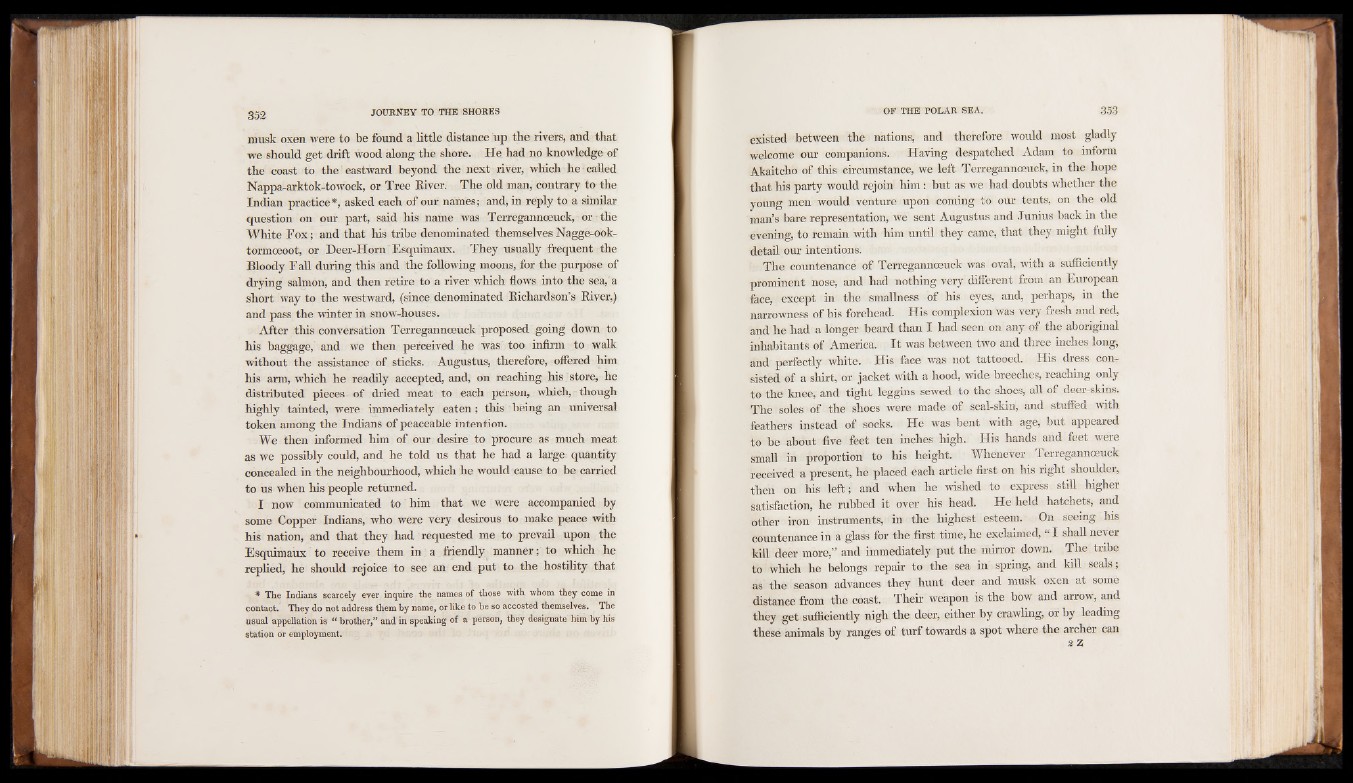
musk oxen were to be found a little distance up the rivers, and that
we should get drift wood along the shore. He had no knowledge of
the coast to the eastward beyond the next river, which he- called
Nappa-arktok-towock, or Tree River. The old man, contrary to the
Indian practice*, asked each of our names; and, in reply to a similar
question on our part, said his name was Terregannceuck, or the
White F ox; and that his tribe denominated themselves Nagge-ook-
tormceoot, or Deer-Horn Esquimaux. They usually frequent the
Bloody Fall during this and the following moons, for the purpose of
drying salmon, and then retire to a river which flows into the sea,'a
short way to the westward, (since denominated Richardson’s River,)
and pass the winter in snow-houses.
After this conversation Terregannceuck proposed going down to
his baggage, and we then perceived he was too infirm to walk
without the assistance of sticks. Augustus, therefore, offered him
his arm, which he readily accepted, and, on reaching his store, he
distributed pieces of dried meat to each person, which, though
highly tainted, were immediately eaten ; this being an universal
token among the Indians of peaceable intention.
We then informed him of our desire to procure as much meat
as we possibly could, and he told us that he had a large quantity
concealed in the neighbourhood, which he would cause to be carried
to us when his people returned.
I now communicated to him that we were accompanied by
some Copper Indians, who were very desirous to make peace with
his nation, and that they had requested me to prevail upon the
Esquimaux to receive them in a friendly manner; to which he
replied, he should rejoice to see an end put to the hostility that
* The Indians scarcely ever inquire the names of those with whom they come in
contact. They do not address them by name, or like to be so accosted themselves. The
usual appellation is “ brother,” and in speaking of a person, they designate him by his
station or employment.
existed between the nations, and therefore would most gladly
welcome our companions. Having despatched Adam to inform
Akaitcho of this circumstance, we left Terregannceuck, in the hope
that his party would rejoin him: but as we had doubts whether the
young men would venture upon coming to our tents, on the old
man’s bare representation, we sent Augustus and Junius back in the
evening, to remain with him until they came, that they might fully
detail our intentions.
The countenance of Terregannceuck was oval, with a sufficiently
prominent nose, and had nothing very different from an European
face, except in the smallness of his eyes, and, perhaps, in the
narrowness of his forehead. His complexion was very fresh and red,
and he had a longer beard than I had seen on any of the aboriginal
inhabitants of America. It was between two and three inches long,
and perfectly white. His face was not tattooed. His dress consisted
of a shirt, or jacket with a hood, wide breeches, reaching only
to the knee, and tight leggins sewed to the shoes, all of deer-skins.
The soles of the shoes were made of seal-skin, and stuffed with
feathers instead of socks. He was bent with age, but appeared
to be about five feet ten inches high. His hands and feet were
small in proportion to his height. Whenever Terregannceuck
received a present, he placed each article first on his right shoulder,
then on his left; and when he wished to express still higher
satisfaction, he rubbed it over his head. He held hatchets, and
other iron instruments, in the highest esteem. On seeing his
countenance in a glass for the first time, he exclaimed, “ I shall never
kill deer more,” and immediately put the mirror down. The tribe
to which he belongs repair to the sea in spring, and kill seals;
as the season advances they hunt deer and musk oxen at some
distance from the coast. Their weapon is the bow and arrow, and
they get sufficiently nigh the deer, either by crawling, or by leading
these animals by ranges of turf towards a spot where the archer can
2 z